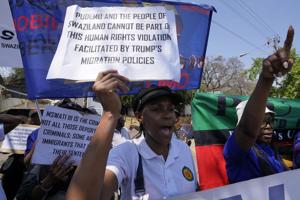A scheduled court hearing in Eswatini regarding the detention of four men deported from the United States was disrupted on Thursday when Judge Titus Mlangeni failed to appear. The case, initiated by several non-profit organizations, questions the legality of holding these men without charges. The deportees, who hail from Cuba, Laos, Vietnam, and Yemen, were sent to Eswatini in mid-July 2023 as part of a controversial deportation program initiated by the Trump administration.
Since their arrival, the men have been held at the country’s maximum-security prison for over two months, during which they have reportedly been denied access to legal counsel, according to their lawyers based in the United States. The absence of Judge Mlangeni left advocates and supporters concerned about the implications for the men’s legal rights and the overall judicial process in Eswatini.
Zakhithi Sibandze, the national coordinator for the Swaziland Rural Women’s Assembly—one of the organizations challenging the detentions—accused the Eswatini authorities of employing delaying tactics to avoid scrutiny. The lack of action raises serious questions about the treatment of deportees and the handling of their cases in a country governed by an absolute monarchy.
The United States initially deported five men to Eswatini, labeling them as dangerous criminals with histories of serious offenses, including murder. Recently, one of the deportees, a Jamaican national, was repatriated to Jamaica. Since July, U.S. authorities have deported more than 30 individuals to various countries in Africa under this program.
Criticism has mounted from international human rights organizations, which argue that deporting migrants to third countries like Eswatini, known for its repressive governance, may expose them to further violations of their rights and a lack of due process. Eswatini, a small nation bordered by South Africa, is one of the last absolute monarchies, where the king holds significant power and rules by decree.
Another legal challenge concerning the deportees has been stalled, as a lawyer seeks to provide legal representation for them. The U.S. government has indicated plans to deport Kilmar Abrego Garcia to Eswatini, but the details surrounding his case remain unclear.
Eswatini government spokesperson Thabile Mdluli declined to comment on the ongoing legal proceedings, leaving many observers concerned about the future of the deportees and the implications for human rights within the kingdom.





































































